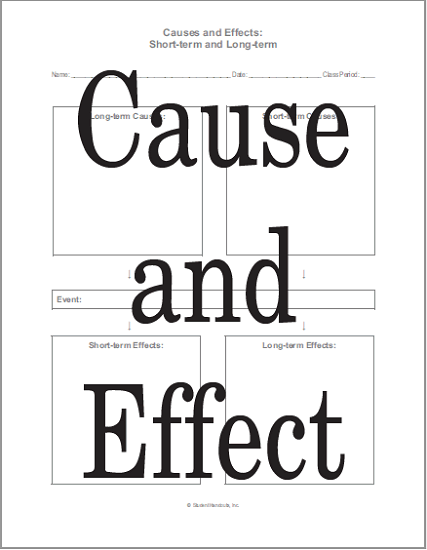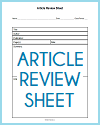| Causes and Effects Chart Worksheet |
|---|
| www.studenthandouts.com ↣ Social Studies ↣ Social Studies Handouts |
 |
   |
|
Click here to print.
This chart can be used with nearly any major historical event or theme (French Revolution, Renaissance, World War II, etc.). The blank chart features short- and long-term causes feeding into the event, with long- and short-term effects coming from the event. The ability to identify the causes and effects of major events is a critical skill that not only enriches students' understanding of history but also equips them with analytical, critical thinking, and decision-making skills that are valuable in various aspects of life, including citizenship and problem-solving. Historical Understanding: Understanding the causes and effects of major events is fundamental to a comprehensive grasp of history. It allows students to make sense of how and why events unfolded as they did. Contextualization: Identifying causes and effects provides context for historical events. It helps students understand the broader social, political, economic, and cultural factors that contributed to specific outcomes. Critical Thinking: Analyzing causes and effects promotes critical thinking skills. Students must evaluate multiple factors and consider the relationships between them to draw meaningful conclusions. Causal Relationships: Recognizing causality is crucial for understanding the relationships between events. It helps students see how one event can lead to another, creating a chain of historical developments. Prediction: Studying historical causes and effects allows students to make informed predictions about future events and their potential consequences. This skill is valuable for anticipating and addressing contemporary issues. Complex Problem-Solving: Analyzing complex historical events requires students to engage in complex problem-solving. They must consider multifaceted factors and their interplay. Empathy and Perspective: Understanding the causes and effects of events can foster empathy and an appreciation for different perspectives. Students can better empathize with individuals and groups affected by historical events. Decision-Making: Learning from history's causes and effects can inform ethical and responsible decision-making. It helps students consider the potential consequences of their actions and decisions. Citizenship: Informed citizens should be able to connect historical events with current societal issues. Understanding historical causes and effects contributes to informed civic engagement. Global Awareness: Major historical events often have global implications. Analyzing their causes and effects enhances students' global awareness and understanding of international relations. Conflict Resolution: Knowledge of historical conflicts and their origins can inform strategies for conflict resolution and diplomacy, both on a personal and international level. Appreciation of Change: Recognizing causes and effects helps students appreciate the dynamic nature of history. It underscores the idea that change is a constant, and historical events shape the course of human development. Interdisciplinary Connections: The analysis of causes and effects in history often involves connecting with other disciplines such as economics, geography, sociology, and political science. This interdisciplinary approach enriches students' education. Research Skills: Investigating historical causes and effects encourages research skills such as data collection, analysis, and the evaluation of primary and secondary sources. Historical Inquiry: Identifying causes and effects fosters a culture of historical inquiry. Students become curious about the past, ask questions, and seek evidence to support their conclusions. |
| www.studenthandouts.com ↣ Social Studies ↣ Social Studies Handouts |














































